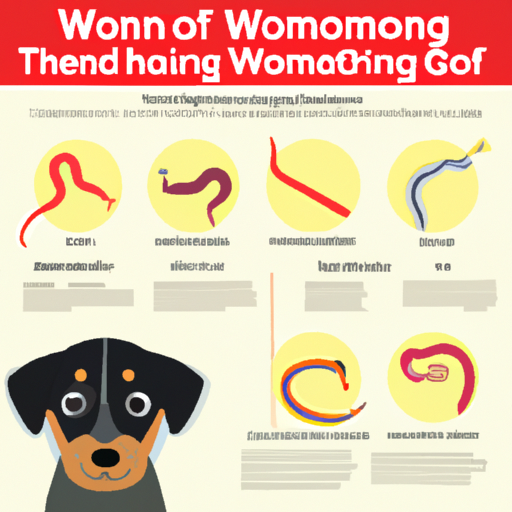“`markdown
What Type of Worms Do Dogs Get?
As a caregiver, your duty is to ensure the health and wellbeing of those in your care, and this responsibility extends to your four-legged companions. In this article, we will be exploring the different types of worms that your dog may encounter in their lifetime.
Understanding Parasites: The Unseen Enemies
Parasites are organisms that depend on a host for survival, often to the detriment of the host. In the case of your beloved pet, these parasites could take the form of worms.
There are several types of worms that dogs can get, each with its own set of symptoms to watch out for. These include:
- Roundworms
- Hookworms
- Tapeworms
- Whipworms
- Heartworms
Know the Enemy: Types of Worms in Dogs
Roundworms
Roundworms, also known as Toxocara canis, are the most common type of worms found in dogs. These worms are often passed from mother to puppy during nursing.
Hookworms
Hookworms, or Ancylostoma caninum, are small, thread-like parasites that attach themselves to the wall of a dog’s small intestine.
Tapeworms
Tapeworms (Dipylidium Caninum) are flat, segmented worms that live in a dog’s intestines. They are usually contracted through the ingestion of infected fleas.
Whipworms
Whipworms (Trichuris vulpis) are long, whip-shaped worms that reside in a dog’s colon.
Heartworms
Heartworms (Dirofilaria immitis) are long, spaghetti-like worms that live in a dog’s heart. They are transmitted by mosquitoes.
| Type of Worm | Common Symptoms |
|---|---|
| Roundworms | Vomiting, Diarrhea, Weight loss |
| Hookworms | Anemia, Diarrhea, Weight loss |
| Tapeworms | Weight loss, Abdominal discomfort |
| Whipworms | Bloody diarrhea, Weight loss |
| Heartworms | Coughing, Fatigue, Weight loss |
FAQs
Q: Can humans get worms from dogs?
A: Yes, some worms like roundworms and hookworms can be transmitted to humans, especially children.
Q: How can I prevent my dog from getting worms?
A: Regular deworming, maintaining a clean environment, and preventing fleas can help reduce the risk of worm infestations.
Q: How are worms in dogs treated?
A: Treatment depends on the type of worm. A vet will prescribe a deworming medication specific to the type of worm your dog has.
Q: Can worms be fatal to dogs?
A: Some worms, like heartworms, can be fatal if not treated early. Regular vet checkups can help in early detection and treatment.
Remember, your dog’s health is at stake. As a caregiver, it’s essential to be well-informed about the risks and signs of worm infestations. Keep your pet safe, healthy, and worm-free.
“`



